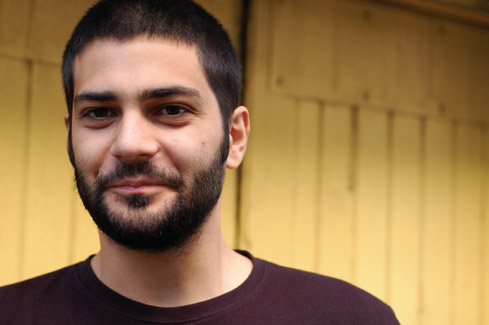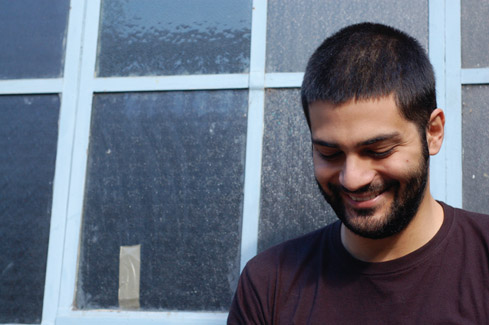“Club and bar audiences find my music ‘downbeat’s and ‘soft’. Audiences with a more experimental approach find it too ‘uplifting’ or structured,” says Dimitri Papadimitriou. “I think that’s why I don’t get many gigs.” Or it could be because you’re new, Dimitri, and what you’ve achieved in the past year is quite remarkable.

(Photo by David Cooper)
Dimitri Papadimitriou’s music is pretty funny. That’s not your first response, of course. After all, the microsampled, granulated and textural grooves he records as Aluf are wrapped in mournful and modulating washes of sound. There are no big bass drops or catchy hooks. The samples offer questions not answers. It’s techno crossed with IDM – music genres not known for their humour – but there is something quite absurd about the cornucopia of sounds, and song titles such as ‘Japanese Burgers’ and ‘Marinated Rizlas’ or, even better, ‘What’s For Breakfast?’ just amplify the absurdity.
Dimitri was born in Athens in 1984 to a Greek dad and an Australian mum. “Family-wise I had a great time while I was growing up,” he says, “but my adolescence was boring and pretty empty – I still hold the fact that they decided to raise me in that god forsaken place against them.” He moved to Sydney to study biology at Macquarie University in 2003, which took care of a few years, but like so many young music makers, the music his “rock record collector” dad bought (’90s favourites like Massive Attack, the Chemical Brothers, the Fugees, Nirvana and Radiohead) stuck with him.
Two things changed for Dimitri in 2004 that shifted his direction. First, he discovered “the wonderful world of jazz,” and, second, the Boogizm crew.
“I was getting kinda tired of the whole techno scene, and electronica in general,” Dimitri recalls. He was given a CD featuring tracks from Boogizm artists such as Fym, dB and Paradroid, and a longer live set from Sutekh. It was the moment. “Instantly, my favourite genres, jazz and electronica, were blended so finely, and what had reached my ears was just so rejuvenating.”
“These four artists became, and still are, my biggest influences. Their music has been described as glitch, micro-house, minimal, IDM, techno and what have you … it made me realise that one can always expand the boundaries of a certain genre, and even go beyond them, as long as one does what feels right, and not try to produce a piece of music that will fall under a specific category and will be heard by a specific audience.”
While those artists produce a tougher, techier sound than Aluf, tracks like Fym’s ‘Moonshine Dolphin’ from 2003 share an obvious aesthetic link. What I find remarkable is how quickly Dimitri has gone from starstruck fan to trusted collaborator, and I think it has something to do with his genuine enthusiasm for their (and his) music.
The first time I heard his work as Aluf was a Post-It note labelled demo CDR midway through 2007. I got in touch immediately. Seth Horvitz (Sutekh) had already heard his music via Myspace, and said he wanted to hear more – “I could not get over his email for three days!” Dimitri exclaimed at the time – and Jeff Milligan of Montreal’s Revolver Records had asked for properly mastered versions. In retrospect, while those first tracks referenced deep house, techno and glitch, the grooves felt unfinished and a little aimless. Dimitri agrees: “My first CD was really [just]fiddling around with different software and learning how everything works. Once I got the grasp of things and was technically equipped, I could focus on the sound I really wanted to get out.â€
“Paradroid had only listened to my demo CD and his immediate response was: ‘We have to do a record together.’ As you can probably imagine, whenever one of these guys contacted me, I was amazed. Not because of their status; because they were always such a big influence on me and I could relate to their music on an extremely personal level. I [thought]guys like Sutekh, Jeff and Paradroid would be in cliques – way over my head – where they are artistically, but it amazed me that all of them are very keen on discovering new artists and are extremely friendly and supportive.”
Max Wending (Paradroid) contacted Dimitri to license a track for Wending’s Spontan Musik label. Soon after, he invited Dimitri to his home in Mainz, Germany, to make music together. “Of course I went and boy was I in for a surprise. Not only did we make music that we are both very happy about, but we formed a great relationship since he is as big a movie fan as I am. We are working on the arrangements of our first four tracks, each track to be remixed by a different artist.”
Andy Vaz from Background and Achim Szepanski from Mille Plateaux have shown interest in the project, Move.E, which Dimitri hopes to have released as a double LP soon. And Sutekh, Dave Miller, dB and Fym are lined up to do the remixes. Dimitri is also working with Sydney producer and Cyclic Defrost contributor Tom Smith (Cleptoclectics) with a view to getting a laptop duo working. And he has an MP3 album set for release on Revolver this month.
He’s learning drums and wants to learn the double bass. He watches movies obsessively and wants to study film composition at film school. It’s been a long year since the first demo came out, as years tend to be when you’re 23, and a pivotal one, with a lot packed into such a short time. He returned to Greece to be with his girlfriend soon after recording the first demo. “I was there for a year,” he says, “and it was pretty miserable. I had to work night shifts at a mini-market in order to buy decent equipment. It was something like eight hours work, eight hours sleep and eight hours producing music. And the occasional movie.â€

(Photo by David Cooper)
Dimitri recently distributed another demo, this time an album. He’s back from Athens (with his girlfriend), ready to rock. LNE, the new demo, represents a significant progression, building on the potential of his first recordings, but also tightening up the objectives. It can’ hurt that Twerk (Merck, Context) was involved in mastering the final release.
“I have been trying really hard actually,” he laughs. “Twerk and I worked closely during the whole process in order to get the job done. I’ve actually been so focused on producing these last couple of years that I haven’t had much time to listen to music as much as I used to.” Listening to music has played a crucial part, however, and a great deal of the musical raw materials came from other people’s final materials.
“I use several techniques [for sampling],” he says. “Matthew Herbert’s cut and paste and Akufen’s microsampling and granular synthesis… but mostly I’m fascinated by dB’s (Daniel Bemberger, Vienna) sample arrangements and, if I had to pick, I’d say my method is nearest to his.
“I start a new track by collecting samples I like and that includes mostly jazz recordings, basslines and strings. I chop them up and try to fit all the pieces together like in a puzzle. I always make sure the harmony and pitch of a series of samples are as similar as possible and thus build up a structure that will result into a melody of my choice. I then use all kinds of short sounds, mostly naturally recorded or extracted from films, and build up the groove on the melody.
“I include a lot of samples. But I usually manipulate them a lot and use them more as sound generators, like a synth,” he says. It’s a time-consuming process building up these textural soundscapes from finely chopped samples, but the basslines and other main elements are sampled too. Mostly from old jazz records.
“I get some jazz recordings from CDs and records, but mostly I spend my time researching on the internet and download them. It’s just like going on an expedition trip through the Amazon. I especially like the older styles: ragtime, classical, New Orleans, boogie woogie, swing and early bebop, and, in my humble opinion, I think artists representing these styles, like Jelly Roll Morton, AJ Piron, Will Marion Cook, Kid Ory, Bix Beiderbecke, Duke Ellington, Charlie Parker, Thelonious Monk, early Armstrong, Dave Brubeck, Art Tatum, Django Reinhardt (the list is just endless) are the most groundbreaking musicians and composers ever to exist!
“Mingus, Davis, Coltrane and Coleman took things a step further,” he says, “but the newer styles just don’t sound as good to my ear. Don’t get me wrong, I enjoy fusion and new jazz from time to time, but in general jazz made from the mid ’60s onwards just hasn’t got the same personality and warmth.” It’s another four decades before Dimitri is prepared to reconnect with the sound – through groups like Strings of Consciousness, Kammerflimmer Kollektief, Computer Soup and Triosk – although it’s debatable whether those sounds are still jazz. The music Dimitri makes is a long way from jazz, that’s for sure.
“People from the downbeat area call it minimal techno and techno heads call it experimental. I don’t think it’s either actually. I like to move people with my music, but whether that takes place in a club or at home doesn’t really matter to me. Audiences around the world tend to associate kinds of music with places and I think that’s a bit pointless. I’d like to have the opportunity to listen to different kinds of music in different places depending on my mood but I can’t do that because it’s all so stereotyped. I mean, where does it say you can’t spin micro-house records at a hip-hop gig or vice versa?”



